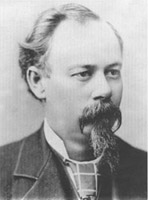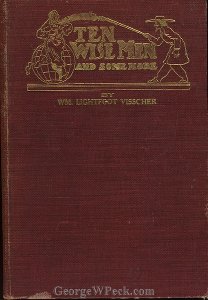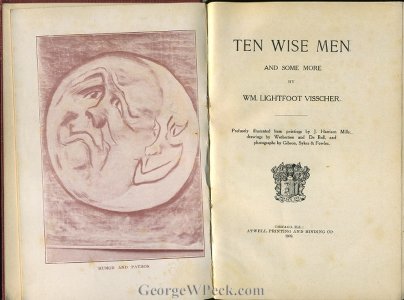|
George Wilbur Peck, writer,
newspaper editor, politician and statesman was born in Henderson,
Jefferson County, New York on September 28, 1840.
Pre War Years
Peck's family history has been well worked out going back to the early
1600's. His ancestors who settled in the Hartford, Connecticut area
were originally from Essex, England. Later between 1803 and 1805 Peck's
family moved to Jefferson County, New York where he was born. His
parents, David B. Peck, a tavern keeper, and Alzenia Joslin Peck moved
to Cold Spring, Wisconsin about 1843. It appears his paternal
grandfather, Luman Peck also made the trip as he was buried in a Cold
Spring cemetery in 1844. Peck had two siblings, Ann E. Peck and
Chauncey E. Peck.
Details of his early years are poorly documented. The family moved to
Whitewater in about 1843. George received his education in the
Whitewater public schools in what was called the "Farmers' College the
country school, located at the crossroads". His first job was at the
Whitewater Register. The Register was established in March, 1857, thus
Peck was 16. Later he was a foreman at the Watertown Republican where
he worked for $3.50 per week.
In about 1860 he was a clerk in the Janesville hotel called the Hyatt
House getting $25 per month. This elegant facility was completed in
1857 and burnt down in January, 1867. Although Peck notes in an
autobiographical blurb that he left the employ of the hotel when it
went broke in 1860, this is not in accord with the facts which reveals
an ongoing business until 1867.
After leaving the hotel he married Francena Rowley of Delavan in 1860.
In early 1861 John W. Blake sold his interest in the Jefferson County
Republican Newspaper to Peck and J.E. Atwater. Peck noted later that
his half was "Putting my labor and influence against what my partner
owed". Peck's partner was Robert Tompkins as of September 1861. In
September 1863 Peck sold out and left for the war. At that point with
new management the paper was renamed the Jefferson Banner.
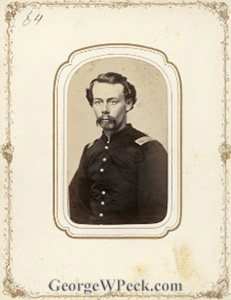
Post War Years
Peck returned to Wisconsin in 1866 after service with the Fourth
Wisconsin Cavalry in the Civil War. During the war he rose to the rank
of second lieutenant serving with both Company L and Company E.
Upon his return in 1866 he along with Jedediah Bowen as his editor
began the weekly Ripon Representative (Volume 1, No. 1 August 30,
1866). This newspaper contained more humor than news and was published
in
1866 and 1867. Peck wrote a column authored by "Terence McGrant". These
Irish dialect sketches satirically noted the nepotism within the
Ulysses Grant administration. They were seen by Marcus "Brick" Pomeroy,
a fellow
Mason, who offered him a position to work at a new newspaper in New
York-the Democrat as an editor/writer. The offer of $40 per week
clearly difficult to turn down. Peck continued to write McGrant
sketches in New York for the newspaper.
He worked with James H. Lambert at the New-York Democrat. James
thereafter in 1871 published Peck's first book Adventures
of One
Terence McGrant. This book was a collation of the columns
that Peck had
written about McGrant. Interestingly there is an ad for the New-York
Democrat newspaper within the book. It must have been very shortly
thereafter that the paper's publication was stopped. Lambert went on to
a career in the newspaper business becoming the managing editor of the
Philadelphia Times. I can find no evidence that Lambert published any
other books.
When the New-York Democrat failed, Peck returned to Wisconsin in
August, 1871 to join the staff of Pomeroy's La Crosse newspaper- the La
Crosse Democrat. The Pomeroy newspapers were conducted on "red-hot
democratic principles". And despite their anti Republican leanings-
Peck who voted for Lincoln in 1864 and Pomeroy worked well together.
Upon his return to La Crosse he worked as an editor for the Democrat
with John Symes and Alfred E. Haven. Because of financial reverses
Pomeroy sold out to Symes and Peck in 1872. The paper's name was
changed then to the LaCrosse Liberal Democrat. They worked together
until 1874 when Peck left to start his weekly newspaper "The Sun".
Interestingly a number of years later in 1879 Swain published Peck's
second book Peck's Fun
under the Symes, Swain and Company, Milwaukee
imprint. This publishing house was active from 1878 to 1892 at which
time they were succeeded by Swain and Tate.
After four years in La Crosse the Sun was not doing well. A move to
Milwaukee (the big city) for Peck's Sun was undertaken and the
newspaper circulation boomed. Within a short time his weekly had
attained a circulation of more than 100,000 by 1884. The popularity of
his Weekly newspaper cannot be overstated. The population of Milwaukee
was 138,000 at the time. The newspaper with the second highest
circulation was the Germania at 50,000 weekly copies. He owned and
edited Peck's Sun until 1890 when he handed over the reins to his son,
George Peck, Jr. The newspaper was subsequently sold to the Dankolers
who consolidated it with the Saturday Star and the South Milwaukee Star.
Peck operated his weekly Peck's Sun out of the five story Evening
Wisconsin Building at the corner of Wisconsin and Michigan Streets. In
the 1880's it was the youngest of the English language newspapers in
Milwaukee but its popularity and growth was quite spectacular at the
time. It had the latest perfecting press able to run at a capacity of
15,000 per hour.
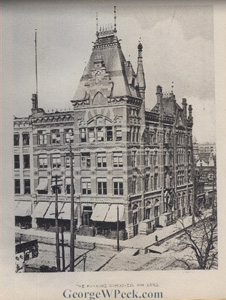
During the 12 years that Peck
ran
the Sun in Milwaukee he wrote a series of stories about Hennery who
subsequently became known as Peck's Bad Boy. These tales of the
outlandish pranks and the various bits of insulting behavior toward all
of society by the "Bad Boy" became immensely popular leading to the
publication of a number of Peck's Bad Boy books beginning in 1883.
Other books which were compilations of Peck's humorous columns also
were published making George Peck a household name and his newspaper
unbelievably popular.
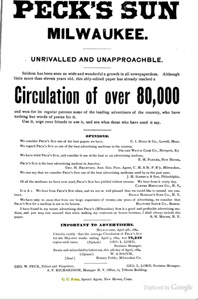
Peck's Sun ad 1889
The inspiration for
Hennery-the Bad
Boy- came from E.J. Watson who was a telegraph messenger boy that Peck
met in the early 1880's. Apparently Watson thought up many of the
stories used by Peck. Mr Watson had in his possession a letter from
Peck "To my friend E. J. Watson, who, as a boy, gave me the first idea
that culminated in the Peck's Bad Boy Series". Interestingly, earlier
in Peck's career he did not quite remember Watson and attributed the
Bad Boy's earliest story to his son -- "Well, my son came in one day
and told me a story about a boy.....That struck me as funny, and I
wrote it up....".
By the 1890's comedy troupes (Mainly Atkinson's Comedy Company) were
performing Peck's Bad Boy on stage all over the east and midwest. The
Bad Boy went on to appear in three movies, was the subject of two board
games, was featured in a number of comic books and was the the star of
magic lantern slide shows at the theatre.
Although many found the exploits of Peck's Bad Boy humorous and
generally good natured fun, this was by no means uniform. An editorial
in February, 1884 New York Tribune stated "..are distressing examples
of the crimes against good taste and decency that are committed in the
name of American humor...." Certainly these stories were written at a
time when a percentage of the population still clung dearly to
Victorian mores, temperance, class distinctions and the like. All
things that Peck made fun of in his stories.
Politics
Before Peck entered into significant public office, he had dabbled a
bit with local politics. In 1867 he was the city treasurer in Ripon.
While in La Crosse he was the Chief of Police in 1874. And in 1874-1875
he served as Chief Clerk of the Legislative Assembly as well as
Assistant State Treasury Agent for Governor Taylor.
Peck ran for mayor in the Spring of 1890. With a majority of 6500 votes
he won easily.
He resigned on November 11, 1890 to become the Governor of Wisconsin.
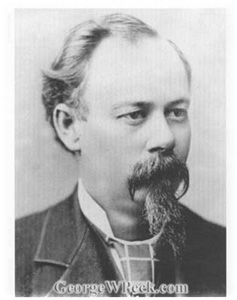
The Peck name had been a well
known
one in Milwaukee in the 1880's thanks to his newspaper's popularity.
Even before the mayoral election of April, 1890 Peck had been a critic
of the ideas behind the Bennett law which had been passed by the state
legislature in 1889. This law had been promulgated by William Dempster
Hoard who had been elected governor the year before . The key component
of the bill required all schools that were recognized by the state of
Wisconsin to teach the major subjects in English. This caused an uproar
in those parochial schools that taught in German. This was profoundly
opposed in Milwaukee, a city with a large German American population,
many of whom were foreign born.
In addition to his opposition to the Bennett law, he was a vocal
proponent for having Milwaukee be the site of the Grand Army Encampment
in 1889. This event would bring a large sum of money into the city
coffers by way of tourist dollars. His success with this in addition to
his support for the repeal of the Bennett Law was crucial in securing
the mayoral nomination for Peck in 1890.
The anti-Bennett Law contingent found a proponent in Mayor Peck and
pushed through his nomination for Governor as the democratic candidate
in August, 1890. A major plank of the democrats noted "The underlying
principle of the Bennett Law is needless interference with parental
rights and liberty of conscience..." He beat Governor Hoard by 28,000
votes garnering a total of 160,000. While governor in 1891 the Bennett
Law was repealed.
He won a second term which ran from January 1893 to January 1895. He
defeated John Spooner by less than 8000 votes out of the 348,000 cast.
He lost to William Upham, a one term governor in 1895. His fate was
similar to most Democratic candidates during that year's elections. He
remained active in politics for awhile at least being elected Chairman
of the State Central Committee by the Democrats in May, 1896.
A key accomplishment of his administration was the recovery of funds
from previous state treasurers*. He instituted "Treasury Suits" against
several former state treasurers to recover funds. It had been a common
practice for the state treasurers to supplement their income with the
interest from bank accounts which held state treasury money. Apparently
the methodology was simple. "If there was a surplus above the daily
needs of the state, it would be deposited in an interest bearing
account. (Quite a change from nowadays-huh). At the end of the quarter
a draft of the interest from these accounta would would be sent to
treasurer in his or her name. The state prevailed in their lawsuits
against the various treasurers.
* Wisconsin in Three Centuries by Henry Colin Campbell
A return effort as the Democratic gubernatorial nominee was a failure
in 1905 when he lost to Robert M. LaFollette by 50,000 votes.
Here is a postcard that was sent out in support of Peck's candidacy.
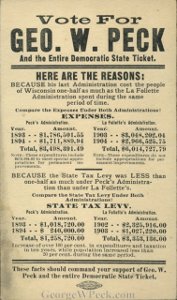
After leaving public office Peck campaigned to make cheese the national
emblem. He asked, "What has the eagle ever done for America?"
And finally
After several years out of public service, in 1899 he reestablished
Peck's Weekly Sun. He again took out office space in the Evening
Wisconsin Building. This venture turned out to be short lived as he
shuttered the paper on April 8, 1900. Peck stated "the cheapness and
completeness of the modern daily newspaper and the low price of
magazines have left no place for the weekly newspaper".
He continued to write books with Peck's Bad Boy in an Airship, Peck's
Boy Boy Abroad, Peck's Bad Boy with the Cowboys and Peck's Bad Boy with
the Circus being published in the twentieth century.
He also dabbled in real estate and business. In 1901 he was the
President of the San Pedro Rubber Plantation Company of Milwaukee. This
company which was incorporated in October, 1900 proposed to develop
land in Mexico to produce rubber. In 1911 he became treasurer of a
newly incorporated insurance company, Independence Life of America.
Peck was a life long Mason affiliated with Wisconsin Lodge No. 13.
He lived with his family in Milwaukee first at 1629 Prospect Avenue. In
1883 he resided a block over at 190 North Farwell Avenue (renumbered
later to 1620-1629) in a rowhouse which he built.
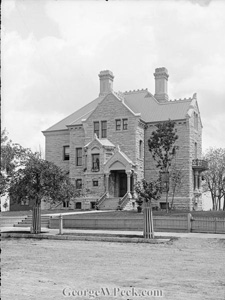
Prospect Avenue
He died from Bright's disease
on
April 16, 1916.
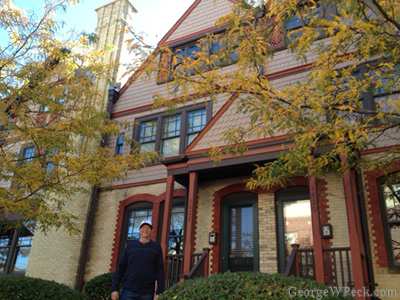
190 North Farwell Avenue
Amazingly enough, Peck's house
on Farwell is still standing. This picture was taken on October 8,
2013.
Sadly the elegant house on Prospect is gone.
This Peck biography appeared
in the Feb. 13, 1886 "Tid-bits", An Illustrated Weekly for These Times.
It was published by the John W. Lovell Company. It is in wraps with
humorous stories, puzzles, cartoons, fashion items, etc. In terms of
content it is not unlike Peck's Sun.
This is an interesting contemporaneous biography.
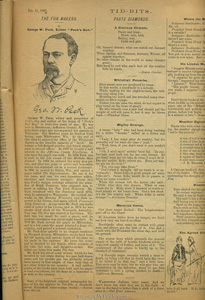
Here is another contemporaneous mini-biography of George W. Peck. This
book, Ten Wise Men, was published in 1909. It includes biographies of a
number of others including Opie Reid and Artemus Ward.
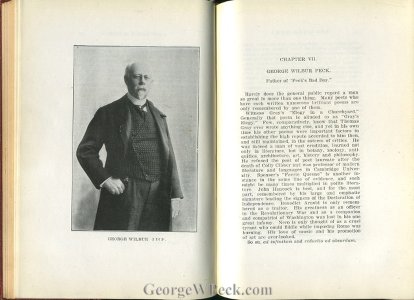 |
